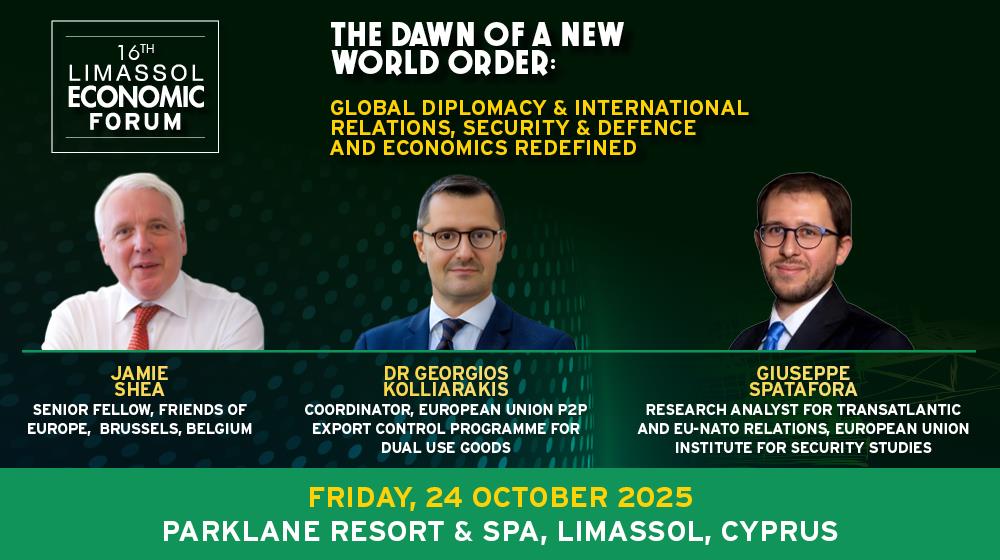Once upon a time, “security” was a word reserved for generals and diplomats.
Today, it belongs to everyone — to entrepreneurs, researchers, and even coders tapping away at their laptops. Because in 2025, wars aren’t declared — they’re launched with a click.
The “Security & Defense” session of the 16th Limassol Economic Forum (24 October 2025, Parklane Resort & Spa) takes us deep into the heart of this new reality — where technology, politics, and strategy have become inseparable.
It’s the moment when Europe looks in the mirror and asks itself: “Can I still defend myself — and how?”
Jamie Shea Asks the Tough Question: Can Europe Still Stand on Its Own?
Veteran NATO official and renowned thinker Jamie Shea returns to the stage with his trademark clarity — and a touch of challenge. His address, “Europe in the Age of Increasing Security Threats and Challenges,” confronts the question no one dares to ask out loud: What can Europe still do with the United States — and what must it learn to do alone?
As Washington’s foreign policy shifts and global crises multiply, Europe faces a historic reckoning. Can it truly build its own defense structures without losing transatlantic unity? And if billions are now being poured into defense budgets, how do we make sure that money is spent wisely — on cooperation, innovation, and resilience, rather than bureaucracy and duplication? Expect Shea’s remarks to be as insightful as they are direct — the kind that leave the audience both inspired and uneasy.
When Innovation Becomes the New Frontline
Next, Dr. Georgios Kolliarakis, Coordinator of the EU P2P Export Control Programme for Dual-Use Goods, takes the discussion from geopolitics to the heart of technology. His presentation, “Balancing the Promotion and Protection of Emerging and Disruptive Technologies for European Defence,” touches on one of the most fascinating paradoxes of our time: innovation as both a strength and a vulnerability.
In today’s interconnected world, universities, start-ups, and research centers have quietly become geopolitical players — often without realizing it. Europe’s challenge is twofold: to foster innovation in AI, robotics, and defense technologies, while guarding against illicit technology transfers and foreign interference.
Kolliarakis will argue that protecting innovation isn’t about closing doors — it’s about building smarter, safer ecosystems where creativity and security can coexist.
It’s a wake-up call for Europe’s tech ambitions — and a reminder that knowledge is now the first line of defense.
Between Ambition and Reality: The EU’s Balancing Act
Then comes Giuseppe Spatafora, Research Analyst at the European Union Institute for Security Studies (EUISS), ready to bring a dose of realism to the conversation.
In his address, “The EU as a Security and Defence Actor: Between Ambition and Reality,” Spatafora examines the gap between what Europe wants to be — and what it actually is. Since the invasion of Ukraine, the EU has stepped up like never before. But can it truly act as a unified security power? How much coordination is real, and how much is political theater? And where does cooperation with Ukraine fit into the evolution of Europe as a credible defense player? Spatafora’s insights promise to be pragmatic, sharp, and unapologetically honest — reminding us that defense isn’t about declarations; it’s about delivery.
A Candid Debate on Europe’s Security Future
The session culminates in a high-stakes panel discussion, “The Future of European Defense & Security,” bringing together Jamie Shea, Dr. Georgios Kolliarakis, and Giuseppe Spatafora for a fast-paced and thought-provoking exchange.
Key questions will take center stage:
- What does “strategic autonomy” really mean in practice?
- Are NATO and the EU partners — or competitors in disguise?
- How do the Eastern Mediterranean’s energy routes shape Europe’s defense priorities?
- And what lessons has the war in Ukraine really taught us about resilience and preparedness?
It’s a conversation that promises intensity, insight, and a touch of intellectual fire — exactly what defines the Limassol Economic Forum.
When Security Becomes Everyone’s Business
The “Security & Defense” session isn’t just about armies or alliances. It’s about rethinking what security means — in a world where AI algorithms, microchips, and energy flows are as powerful as missiles. It’s about how Europe — and Cyprus, at its strategic crossroads — can turn challenges into opportunities for leadership, innovation, and cooperation.
Limassol: Where Ideas Become Strategy
Once again, Limassol transforms into a meeting point for global minds — a place where business leaders, diplomats, economists, and visionaries gather not only to discuss the world’s future, but to shape it. In a time of shifting power and rising uncertainty, the Security & Defense session reminds us that safety is not guaranteed — it’s built. And that the strongest defense for Europe’s future may not be its armies, but its ability to think, adapt, and act together.
Conference Information
Organizers: IMH and IN Business magazine
Platinum Partners: Bank of Cyprus, Deloitte Cyprus, Elias Neocleous & Co LLC
In collaboration with: Cyprus LSE Alumni Association
Technology Partner: ASBIS
Supporters: Limassol Chamber of Commerce & Industry, Cyprus Shipping Chamber, Ιnvest Cyprus, National Betting Authority
Media Sponsors: Alpha Cyprus, Cyprus Business News (CBN), GOLD magazine
For more information and registrations, please contact IMH:
Tel: +357 77777741│ Fax: +357 22679820
Email: events@imhbusiness.com









